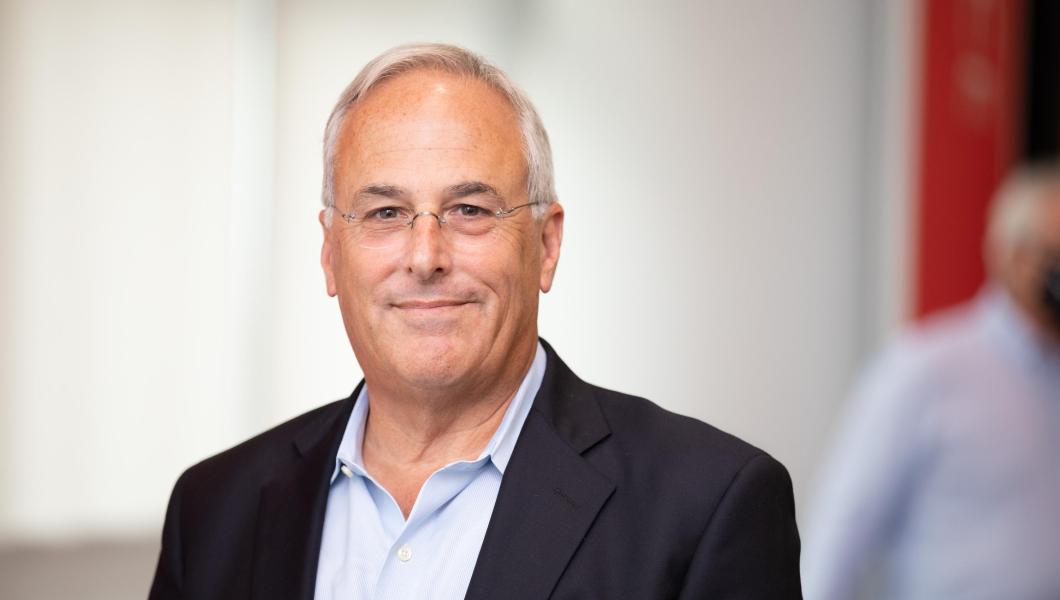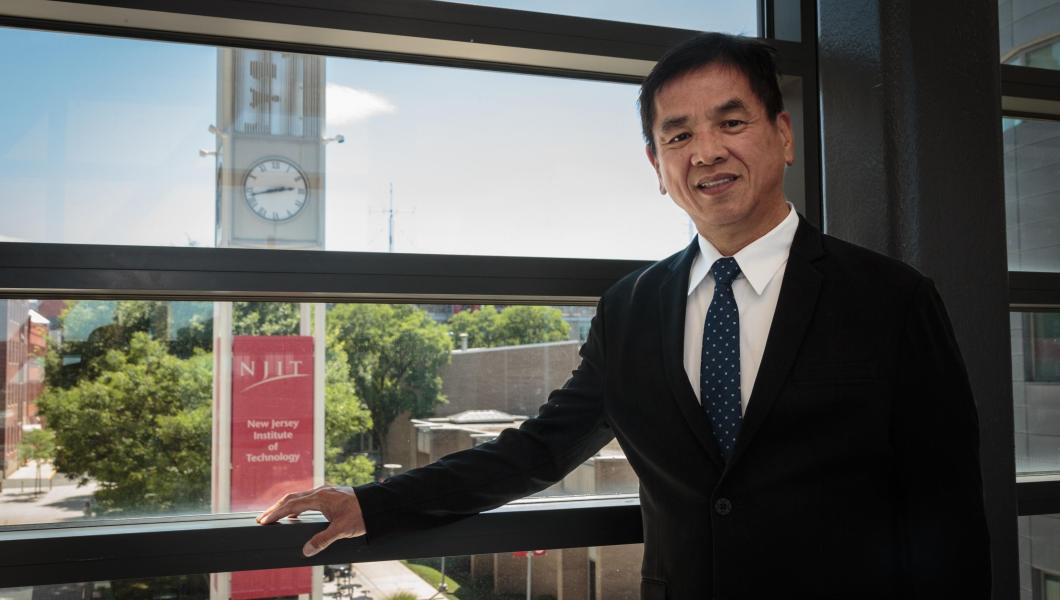Industrial Designer Matthew Negron Shares his Path from NJIT to President of Dauphin Americas

When Matthew Negron ’13, ‘16 started his education at NJIT, he was among the earliest cohorts to join the newly-formed industrial design program at Hillier College of Architecture and Design.
Initially starting as an architecture student, his interests shifted and found that the budding industrial design program was the best fit to mix his passions for art, technology and materials. After completing his bachelor’s degree, Negron came back to NJIT to get his Master of Science in Management and Master of Science in Manufacturing Systems Engineering. He’s currently the president of Dauphin Americas, and the youngest executive leader of a manufacturer in his field.
He recently won the HiP Award for Manufacturer: HiP Leader Furniture. During the 2023 interior design conference NeoCon, he was a panel speaker in the presentation "BIFMA + IFMA: Return to Occupancy: New Paradigms" and moderated the "Emerging Design Leaders Forecast The Future" panel. He also became the first industrial designer or manufacturer to be president of an IIDA chapter, beginning his term July 1.
As he keeps fulfilling his life goals, Negron thanks his mother and grandparents that played a vital role in shaping him as a person. Growing up he visited his grandparents in Brooklyn, and highlights that time as crucial as he learned about carpentry from his grandfather and fine arts from his grandmother.
“Industrial design allowed me to bridge that without knowing that at the time. Thank goodness I went to school when I did because had I gone to school five years before there would have been no industrial design program. I may have ended up in mechanical engineering or architecture. It would have been a very different career path,” he says.
How special was it to win the HiP Leader: Manufacturer Award from Interior Design magazine?
It was extremely exciting. It was one of those things that you put time, effort and work into in the past few years, and you're not expecting anything from it necessarily. But the fact that you get that recognition in the market from your peers is a big deal because it's not just your circle of people, but it's also other industry leaders. It's a really big deal, so it's very exciting. I was very humbled by it, but very excited.
From your participation in NeoCon, what were your main takeaways?
It was definitely a NeoCon for the books, it'll definitely be one that I remember for a very long time because we don't get those opportunities annually. Coming out from the pandemic last year, we were just kind of clawing our way back in the market in 2022, and we got our first best NeoCon Award after 12 years or so. This year, we walked away with three Best NeoCon Awards, which is a big deal. It just validates our marketing efforts and the product that we're developing, and then we got the Metropolis Likes Award, we got the New York City Design Award before NeoCon and then three of our products were HiP finalists, they didn't win the final award, but they still received recognition in the marketplace.
What does it mean to be one of the youngest executive leaders in your field?
Age is just a number, but I really think we need to validate younger generations. I even say for myself, I'm a millennial, but Gen Z is up and rising, and we need to respect them in the industry and in the marketplace, in the economy just as much as someone in their 60s and 70s, we all have value to bring into the market. We should be bringing all different points of views and perspectives to the table, and that's what's going to push every industry forward.
As the new president of the IIDA PA/NJ/DE chapter, how important has it been in your professional career?
The way I look at IIDA, it's multifaceted. And for me, you have an aspect of mentor-mentee relationships that naturally develop through IIDA across your chapter, but also across the country. It's international, so it can really be anywhere in the world. I say, one, you can learn a lot from individuals that are there who have more knowledge than you or different points of view. You're getting a wide array of manufacturers, interior designers, furniture dealerships, so you're getting these different points of view at 10,000 feet that you typically wouldn't get. For me, it's super important to be involved with these different organizations because they really do push the industry forward. You're also talking about IIDA headquarters out of Chicago, they do research consistently, so if you're part of the organization, your fingers kind of on the pulse to new research ideas, thought starters, things that can really cultivate the next gen of how we work and what we do. The IIDA has been integral for me I say in terms of my career development, it's been integral from making new and meaningful connections. I think that's what's important for me is that everything we need to do has to be done with intention.
How special was it to bring this year’s Fashion Meets Finish to NJIT?
There were 550-plus people that were at Fashion Meets Finish, and they ranged from interior designers, to architects to just manufacturers to salespeople, so it was like a little bit of everybody was hanging out in the same room, but we all are in the same industry. It was really cool because it was a chance to bring it back to my alma mater. Wendy Ceron, who was one of the co-hosts, was an interior design graduate in 2013, too. She was able to host it, and then you had Jacqueline S. Wolverton from HDR, who’s a very influential person in the design market, and she had a great time connecting it back to a campus and university that has interior designers. It was a full circle moment for everybody.
You are currently an adjunct professor at Kean University, previously at NJIT, how do you transfer your experiences to the students in the classroom?
For me, it's an opportunity to kind of turn off my brain for a few hours when I'm teaching and really become insightful and try to relearn and get out of my own ways of things that I've done a thousand times. And then on the other side, I'm able to bring the students to kind of my world of what we do on a practical standpoint of large volume manufacturing, where we're producing hundreds to 1000s of units of a certain product, and also how we're manufacturing and how we design, how we market, how we do traditional marketing, and how we do guerilla marketing at a really low cost. They're able to learn from that, and what happens it becomes this great cycle, like a feedback loop. We’re able to go back and forth, and explore both what I'm doing and what they want to do. And to me, that's the beautiful aspect of it.
Teaching should never be a one way street. It has to be an open dialogue, where you're both willing to accept that you could be wrong, even as a professor, it's like I could be wrong, or maybe it's time for me to adapt to a new way. And the students are also in a position where they're like, “Well, I wanted to do this, how do we do that?” And explore new ideas.
What advice would you give current students?
Put yourself in uncomfortable situations, do things that you typically wouldn't think are normal. Don't be afraid to ask questions. Just ask, and the way I mean is that when I got my first internship, I went to the International Contemporary Furniture Fair in New York. I went around and I had a mentor at the time, and he made me collect 20 business cards before I could leave. And then he made me email them asking for an internship, and I got offered seven. When I started working at DESIRON, Frank Carfaro, who was the owner, came as a guest lecturer for a class and after class, I said, “I want to work for you, what do I have to do?” And he said, “Send me a resume.” And I got a job out of it. I say the same thing with Dauphin with the sales position and all these different opportunities, a lot of it just came from asking, and taking the initiative. For students, put yourself in those uncomfortable situations, don't be afraid to ask, but also make sure you're willing to put in the time and effort when it's required. Not a 24/7 thing, but you definitely need to work hard. A lot of it it's just luck and asking, you'll be amazed when people will say yes when you ask.

